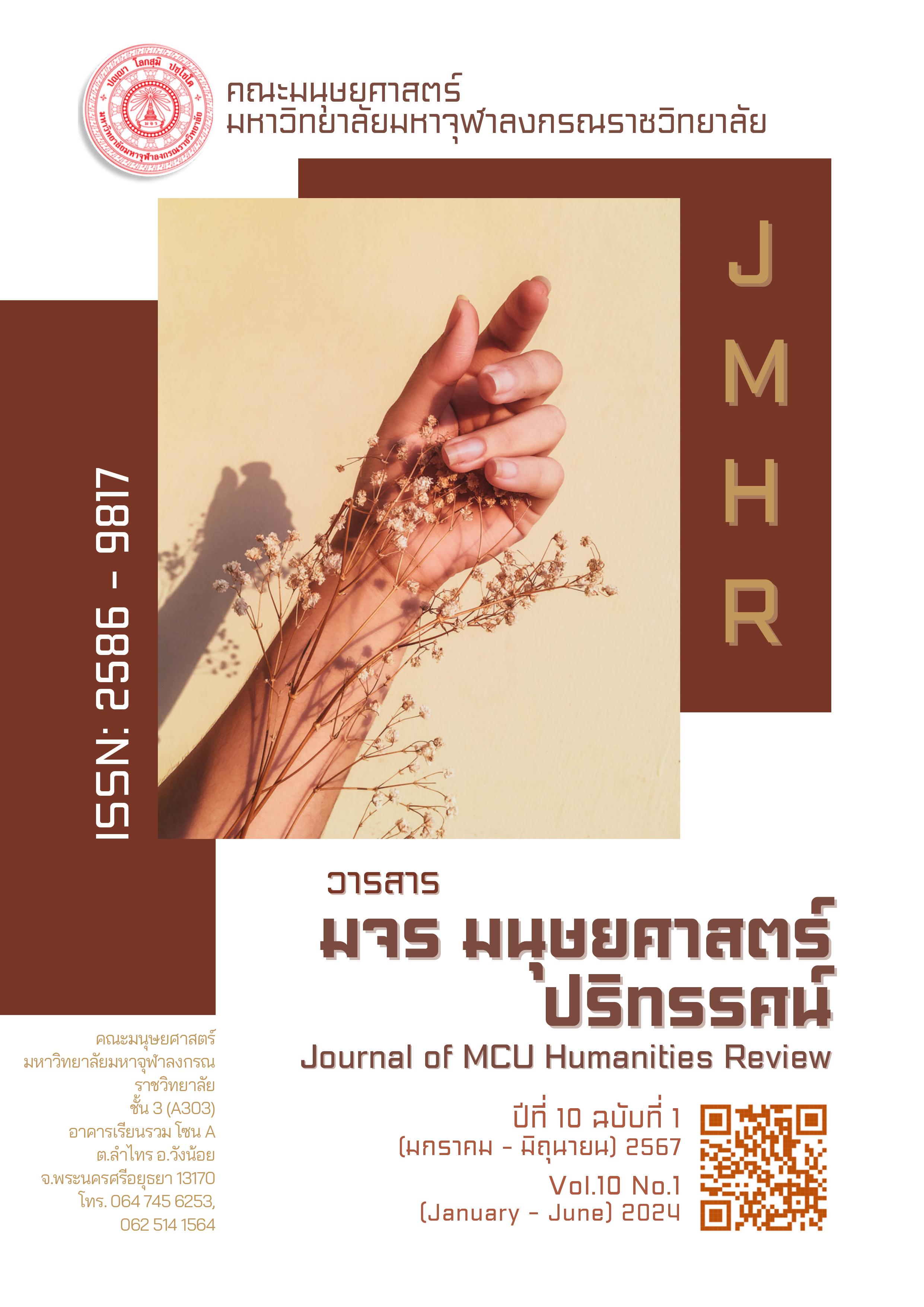พุทธจิตวิถีและแนวโน้มของโหราศาสตร์ไทยในการให้การปรึกษาแห่งทศวรรษหน้า (พ.ศ. 2565-2574)
คำสำคัญ:
พุทธจิตวิถี, โหราศาสตร์ไทย, คลินิกการให้การปรึกษาแนวพุทธ, การสร้างสรรค์, ทศวรรษหน้าบทคัดย่อ
งานวิจัยนี้เป็นการวิจัยอนาคตแบบผสานวิธีเชิง EDFR ซึ่งเป็นการผสานระหว่างเทคนิค EFR และ Delphi มีวัตถุประสงค์ 1) ศึกษาวิเคราะห์หลักการพุทธจิตวิทยา และชุดความรู้โหราศาสตร์ไทยแห่งอนาคตในการให้การปรึกษาแนะนำ 2) สังเคราะห์ข้อมูล และทิศทางพุทธจิตวิถีกับแนวโน้มโหราศาสตร์ไทยแห่งอนาคตในการให้การปรึกษาแนะนำ 3) นำเสนอฉากภาพพุทธจิตวิถีกับแนวโน้มโหราศาสตร์ไทยในการให้การปรึกษาแนะนำอย่างสร้างสรรค์ในทศวรรษหน้า การวิจัยครี้งนี้มีเครื่องมือวิจัย 4 ประเภท คือ 1) แบบสัมภาษณ์เชิงลึก ผู้เชี่ยวชาญ 21 รูป/ท่าน 2) แบบสอบถาม ผู้เชี่ยวชาญกลุ่มเดียวกัน 3) การสนทนากลุ่ม ผู้เชี่ยวชาญ 13 รูป/ท่าน 4) การเสวนาภูมิปัญญาผู้เชี่ยวชาญพิเศษ ผู้เชี่ยวชาญ 12 รูป/ท่าน ผู้ให้ข้อมูลสำคัญในขั้นตอนของการสัมภาษณ์ แบ่งออกเป็น 3 กลุ่มคือ 1) กลุ่มพระภิกษุสงฆ์ 2) กลุ่มนักจิตวิทยา 3) กลุ่มนักโหราศาสตร์ โดยจะทำการสัมภาษณ์ใน 3 มิติ คือ ด้านบวก ด้านตรงข้าม และด้านที่เป็นไปได้มากที่สุด ข้อมูลคุณภาพทำการวิเคราะห์โดยใช้ QDAT Knowledge หรือ 6’C เทคนิค เทคนิคสามเส้า และข้อมูลอิ่มตัว ส่วนข้อมูลเชิงปริมาณวิเคราะห์ค่าสถิติโดยการหาค่ามัธยฐาน (Md), ค่าพิสัยระหว่างควอไทล์ (IR), ค่าเฉลี่ย () , ค่าเบี่ยงเบนมาตรฐาน (SD)
ผลการวิจัยพบว่า 1) ชุดความรู้โหราศาสตร์การให้การปรึกษาแห่งอนาคตจะต้องมี องค์ประกอบของหลักธรรม และหลักจิตวิทยาการให้การปรึกษาเป็นพื้นฐานสำคัญในการให้การ ปรึกษา และต้องมีการใช้เทคโนโลยี และนวตกรรมเพื่อพัฒนาหลักสูตรการเรียนการสอน การสร้างเครื่องมือการพยากรณ์ เพื่อรองรับการเปลี่ยนแปลงของสังคมในยุคโลกาวิวัฒน์ 2) การพัฒนาศักยภาพคุณธรรมจริยธรรมของนักโหราศาสตร์จะมีมากขึ้น รวมทั้งเรื่องของเทคโนโลยีใหม่ ๆ ที่เป็นประโยชน์ต่อการให้การปรึกษาภายใต้ความรักความสามัคคี และความร่วมมือร่วมใจกันพัฒนาต่อยอดองค์ความรู้ให้เป็นศาสตร์แห่งปัญญาที่มีคุณธรรมนำความรู้ และเผยแพร่สู่ความเป็นสังคมพุทธศรัทธาโหราศาสตร์การให้การปรึกษาอย่างสร้างสรรค์ตามแนวทางอริยสัจสี่ 3) ฉากภาพอนาคตมีองค์ประกอบสำคัญ 12 ประการ คือ 3.1) การประกอบการเพื่อสังคม 3.2) ภาพลักษณ์ของโหราศาสตร์ 3.3) ศูนย์รวมองค์ความรู้ 3.4) องค์กรพัฒนาโหราจารย์ 3.5) หลักสูตร BPAC 3.6) การศึกษาชั้นสูง 3.7) อริยสัจวิถีการให้การปรึกษา 3.8) AI การให้การปรึกษา 3.9) การจัดสัมมนาวิชาการนานาชาติ 3.10) องค์กรวิชาชีพโหราศาสตร์ 3.11) ศูนย์สร้างพลังบวก และ 3.12) ทางเลือกในการทำงาน
เอกสารอ้างอิง
กองยุทธศาสตร์และแผนงาน กรมสุขภาพจิต. (2564). แผนการฟื้นฟูจิตใจในสถานการณ์การระบาดของโรคติดเชื้อไวรัสโคโรนา 2019 (COVID-19) (Combat 4th Wave of COVID-19 Plan: C4). สืบค้น 18 พฤษภาคม 2564, จาก https://www.dmh.go.th/covid19/pnews/files/c4plan_21092563.pdf
เกรียงไกร กันยะ. (2556). การจัดทำจรรยาบรรณของนักโหราศาสตร์ในสังคมไทย (วิทยานิพนธ์ปริญญาศิลปศาสตร์มหาบัณฑิต). มหาวิทยาลัยศิลปากร. กรุงเทพฯ.
ณิชชา เบญจพรวัฒนา. (2558). แนวโน้มการวิจัยเชิงอนาคตในประเทศไทย. วารสารครุศาสตร์ปริทรรศน์ฯ, 2(2), 59-72.
ณัฐชนน เฉลิมแสน และ ปรมาภรณ์ วีระพันธ์. (2565). มาตรการทางกฎหมายในการกำกับดูแลการให้บริการการดูดวง. วารสารมหาจุฬานาครทรรศน์, 9(9), 106-119.
ทีมข่าวข่าวสด. (2562, 5 มกราคม). อธิการบดี ลาดกระบัง ปลื้ม! นศ.แห่ลงเรียนวิชาโหราศาสตร์ ทำนายชะตา เตรียมเปิดเพิ่ม. ข่าวสด. สืบค้นเมื่อ 18 พฤษภาคม 2564, จาก https://www.khaosod.co.th/special-stories/news_2049429
นิศากร บุญอาจ. (2561). ผลของโปรแกรมการดูแลสุขภาพผู้ป่วยด้วยหัวใจความเป็นมนุษย์ตามแนวพุทธจิตวิทยา (วิทยานิพนธ์พุทธศาสตรดุษฎีบัณฑิต). มหาวิทยาลัยมหาจุฬาลงกรณราชวิทยาลัย. พระนครศรีอยุธยา.
พระครูสุภัทรวชิรานุกูล, พูนชัย ปันธิยะ, เทพประวิณ จันทร์แรง และ เยื้อง ปั้นเหน่งเพ็ชร์. (2563). การประยุกต์ใช้หลักโหราศาสตร์ตามแนวพระพุทธศาสนา. วารสารพุทธศาสตร์ศึกษา, 11(2), 410-426.
มหาหมอดูดอทคอม. (2566). จรรณาบรรณโหร. สืบค้น 22 พฤษภาคม 2566, จาก http://www.mahamodo.com/modo/knowledge/hora_ethics.asp
วรรธิดา สงขาว และพระมหาหรรษา ธมฺมหาโส. (2563). กระบวนการให้คำปรึกษาของนักโหราศาสตร์ ในสมาคมโหราศาสตร์นานาชาติด้วยหลักพุทธสันติวิธี. วารสารสันติศึกษาปริทรรศน์ มจร, 8(4), 1539-1551.
วิวัฒน์ จารึกศิริ. (2564). โหราศาสตร์ไทย: เกร็ดความรู้โหราศาสตร์หรือเคล็ดลับของท่านจันทรสาร 1. สืบค้น 28 พฤษภาคม 2564, จาก https://www.astroneemo.net/index.php/2016-08-06-14-13-07/167-2010-03-31-15-49-34/1360-1.html
วัชพร ทุมมานนท์. (2559). การประยุกต์หลักพุทธสันติวิธีในการพยากรณ์ของนักโหราศาสตร์ไทย. วารสารสันติศึกษาปริทรรศน์ มจร, 4(ฉบับพิเศษ), 196-208.
สุชาติ ประสิทธิ์รัฐสินธุ์. (2561). ศาสตร์ว่าด้วยการวิจัยอนาคตการณ์ I. สืบค้น 20 พฤษภาคม 2566, จาก https://library.parliament.go.th/th/digest/digest-2564-jun66
อภิวัฒน์ รัตนวราหะ. (2563). อนาคตศึกษา. (น.61-62). เชียงใหม่: หจก. ล๊อคอินดีไซน์เวิร์ค.
อริย์ธัช เลิศรวมโชค, พระครูสุธีคัมภีรญาณ และพระมหาดาวสยาม วชิรปัญฺโญ. (2023). โหราศาสตร์ปัจจุบันในมิติแห่งพุทธศาสตร์. วารสาร มจร พุทธปัญญาปริทรรศน์, 8(1), 299-308.
Admission Premium. (2566). แปลกแต่จริง!! 9 วิชาสุดแปลกที่เปิดสอนในมหาวิทยาลัยไทย. สืบค้น 4 มีนาคม 2566, จาก https://www.admissionpremium.com/content/4385
Admission Premium. (2566). รีวิวสาขาการแพทย์แผนไทยประยุกต์ 4 ปี เรียนอะไรบ้าง. สืบค้น 6 มีนาคม 2566, จาก https://www.admissionpremium.com/content/5726
Astrohamburg. (2566). สถาบันโหราศาสตร์. สืบค้น 22 พฤษภาคม 2566, จาก https://astrohamburg.wordpress.com/สถาบันโหราศาสตร์/
HotcoursesTHAILAND. (2566). รวม 1 หลักสูตรโหราศาสตร์ระดับหลักสูตรปริญญาโทและเอกจาก University of Wales Trinity Saint David (UWTSD / Lampeter/ London). สืบค้น 12 เมษายน 2566, จาก https://shorturl.asia/QxvS5
Weraveyou. (2566). How Can Astrology Look in the Metaverse?. Retrieved 1 January 2023, from https://weraveyou.com/2022/10/how-can-astrology-look-in-the-metaverse/
ดาวน์โหลด
เผยแพร่แล้ว
รูปแบบการอ้างอิง
ฉบับ
ประเภทบทความ
หมวดหมู่
สัญญาอนุญาต
ลิขสิทธิ์ (c) 2024 วารสาร มจร มนุษยศาสตร์ปริทรรศน์

อนุญาตภายใต้เงื่อนไข Creative Commons Attribution-NonCommercial-NoDerivatives 4.0 International License.






